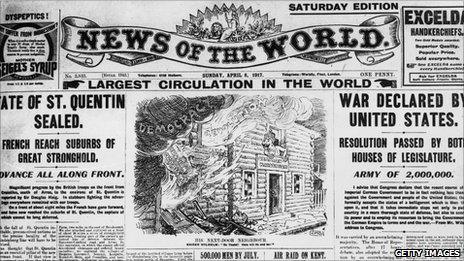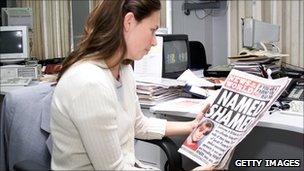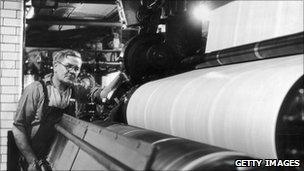News of the World: An obituary
- Published

The closure of the News of the World brings to an end more than 160 years of history.
The Sunday tabloid was first published on 1 October 1843 in London - but this Sunday will see the last edition hit the newsstands. Its closure comes amid a major scandal over phone-hacking and alleged payments to police officers.
Owned by News Group Newspapers, part of News International, which is in turn a subsidiary of Rupert Murdoch's News Corporation, the News of the World's sales currently average 2,812,005 copies per week. Its owners claim that it is read by more people than any other English-language newspaper.
James Murdoch, deputy chief operating officer of News Corporation, and chairman of News International, said the paper had "enjoyed support from Britain's largest advertisers" and "has a proud history of fighting crime, exposing wrong-doing and regularly setting the news agenda for the nation".
Private lives
But it has not been without critics throughout its history. Coverage of many sex scandals, often of the rich and famous, earned it the soubriquet of "News of the Screws" in the satirical magazine Private Eye.
And this interest in private lives goes back decades.
"It was a very important part of British newspaper history. In the 19th Century it was one of the highest circulation papers catering for the newly semi-literate population," says Chris Horrie, tabloid newspaper historian and co-author of Stick it up your Punter: The Uncut Story of the Sun Newspaper.
"In the 20th Century - until [Rupert] Murdoch bought it - it was a strange sideshow in British life, very similar to the saucy seaside postcard. It was full of dirty vicars. There was a specific loophole in libel law that didn't allow vicars to sue."
Murdoch's purchase changed things dramatically.
"Murdoch bought it and completely transformed it. He turned it into a very modern practitioner of chequebook journalism," says Horrie.
"The news happened during the week and wasn't exclusive. But the News of the World would buy up all the stories about celebrities and politicians and pile them up on a Sunday. It was 1980s chequebook journalism."
In both prominence and circulation, the News of the World was king of the Sunday tabloids.
"The paper became completely dominant on Sundays," Horrie notes.
"The Mirror group's Sunday Mirror and People were completely destroyed. So on Sunday Murdoch had these two enormous things - the Sunday Times and the News of the World. The Mail group were the only significant competition."
One of the paper's most controversial moments came in 1966, during the Ian Brady and Myra Hindley murder trial, when it emerged in court that the key prosecution witness had been paid by the paper to give his side of the story.
David Smith accepted £1,000 and was sent on holiday to France as well.
The attorney general was asked to investigate what the judge called "a gross interference in the course of justice" but the newspaper escaped contempt charges.

The paper was prominent in naming and shaming paedophiles
In 2000, the paper began a controversial campaign to "name and shame" alleged paedophiles, following the abduction and murder of eight-year-old Sarah Payne.
The paper has also campaigned for the introduction of "Sarah's Law" to allow public access to the sex offenders register.
The newspaper's report that Formula 1 chief Max Mosley had paid five women to take part in a sadomasochistic orgy prompted a major legal battle over privacy.
The High Court ruled in July 2008 that the News of the World had breached Mosley's privacy. He was awarded £60,000 in damages.
Arguably the most famous journalist on the paper in recent years was undercover specialist Mazher Mahmood.
His exposes - often carried out using his disguise as the "Fake Sheikh" - targeted everyone from the Countess of Wessex to former England football manager Sven-Goran Eriksson. The News of the World also claims he has brought about the conviction of more than 250 criminals.
In August 2010, posing once again as the "Fake Sheikh" he exposed a group of Pakistani cricketers, accused of corruption.
Hacking accusations
But the tide began to turn against the paper in January 2007, when its royal editor Clive Goodman and private investigator Glenn Mulcaire were jailed for hacking, after it was found they targeted Prince William's aides.
This set off a chain of events which has led to accusations of journalists hacking into the voicemails of the families of murder victims and relatives of UK soldiers killed in action.

The paper is said to have the largest readership of any in English
Announcing the paper's closure, James Murdoch said the paper "is in the business of holding others to account. But it failed when it came to itself".
Paul McMullan is the former News of the World deputy features editor who helped blow the whistle on phone-hacking practices at the paper.
"It's the end of the biggest-selling English language newspaper in the world - the end of 170 years of history," he says.
"It was a great part of my career, but I was joyful when I heard the news.
"Ten years ago I was proud to say I worked at the News of the World. Last week I was ashamed."
Now, it seems the Sun will be published on a Sunday to fill the gap, but there will be a question mark over who will inherit the News of the World's audience.
"Newspaper readers are pretty disloyal," says Horrie.
- Published7 July 2011
- Published7 July 2011